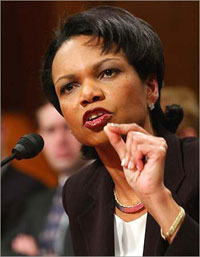Condoleezza Rice meets with Europeans to discuss Lebanese political crisis
Pro-government and opposition leaders in Lebanon didn't advance in electing a new president or in the formation of two opponent administrations. U.S. Secretary of State Condoleezza Rice was set to discuss Lebanon with politicians from France and Germany.

With time running out, the election has become a showdown between Iran and Syria, who back the opposition, and the United States and its European allies, who support the parliamentary majority and Prime Minister Fuad Saniora's government.
The militant Hezbollah group, which leads the opposition and is considered a terrorist group by the U.S., has warned against American influence in Lebanon and has said Washington's goals in the country will be thwarted.
U.S. Secretary of State Condoleezza Rice was set to discuss Lebanon Saturday with diplomats from France and Germany on the sidelines of a meeting on Iraq in Turkey. French, Spanish and Italian foreign ministers visited Lebanon last month to urge leaders to settle the country's political crisis.
Parliament is scheduled to make another attempt to elect a president on Nov. 12, but like the two previous attempts in September and October, the government and the opposition have been unable to reach a compromise ahead of the session. Failure to pick a leader to replace pro-Syrian President Emile Lahoud, whose term expires Nov. 24, could throw the country into further political chaos, potentially leading to violence.
On her flight to Europe Thursday, Rice laid down strong conditions she said the U.S. and Lebanon's European backers demand in the upcoming election.
"There's a lot of talk right now about compromise in Lebanon," Rice said. "But any candidate for president, or any president, needs to be committed to the constitutional order, needs to be committed to Lebanon's sovereignty and independence."
Parliamentary majority leader Saad Hariri has held meetings with opposition politicians in the past two months, including Michel Aoun and Parliament Speaker Nabih Berri. The discussions, which focused on establishing a compromise presidential candidate and the future political agenda, were inconclusive but slightly eased political and sectarian tensions across the country. However, the situation remains tense.
Rice said the next president must support U.N. Security Council resolutions protecting the country's sovereignty and commit to carry out a tribunal for any suspects in the killing two years ago of former Lebanese Prime Minister Rafik Hariri.
She said Lebanon's international backers want to ensure they are "sending the right messages" to the country's anti-Syrian bloc that it not be forced into accepting "extraconstitutional measures or measures that undermine the program they stand for."
France, Germany, Italy and Spain are the major contributors to a U.N. force keeping the peace between Israel and Hezbollah along the border in southern Lebanon. They have a stake in stability in Lebanon because political upheaval in Beirut could have grave implications for the 13,500-strong peacekeeping force from 28 countries.
There have been dire warnings that failure to elect a president could lead Lahoud to appoint the head of the army to run the country to prevent the Saniora government from taking over executive power as required under the constitution. The majority has said it could elect a president by a simple majority, a move that the opposition rejects as illegal and could result in two administrations.
Lahoud and the opposition consider the Saniora government unconstitutional under Lebanon's sectarian-divided political system because representatives of the Shiite Muslim community, considered the largest sect, left the Cabinet 11 months ago and joined the opposition, a move that precipitated the current crisis.
Hassan Nasrallah, the leader of the Shiite militant Hezbollah group, has urged the Lebanese to settle their differences, saying unity strengthens the country.
Speaking on a giant screen Thursday night to an agricultural fair in a Hezbollah stronghold in south Beirut, Nasrallah welcomed recent dialogue between the government and the opposition but warned the U.S. and Israel did not want it to succeed.
"We know that the American and Israeli interest is to push the Lebanese into a collision and confrontation among themselves," the cleric said. "Dispute leads to failure while consensus, cooperation and unity is the most important element of strength."
Hezbollah's south Lebanon chief, Sheik Nabil Kaouk, last week put the presidential election in the context of a confrontation with America.
"The presidential election for us is a fateful and prime stage in the definite defeat of the American administration and Israel behind it," he told a rally. "Lebanon is not an arena for (America's) dreams about a new Middle East and to make up for its losses in Iraq."
Subscribe to Pravda.Ru Telegram channel, Facebook, RSS!


